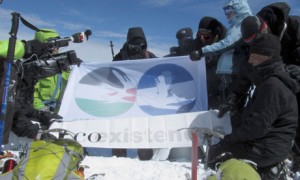Peace summit or the height of folly?
By Khaled Diab
Can an activists' peace summit at the top of Mont Blanc help bridge the abyss of Israeli-Palestinian conflict?
24 August 2010

With diplomacy leading nowhere in a hurry and the situation steadily worsening between Israelis and Palestinians in recent years, even the most optimistic doves have had their wings clipped by the hawks who prey on every fledgling initiative, often before it has had a chance to hatch.
Against the backdrop of this political vacuum, a group of young Israelis and Palestinians (all of whom are citizens of Israel) have quite literally held their own peace summit – at the top of Mont Blanc.
Backed by the Swiss NGO Coexistences, the eight young men and women scaled Europe's highest mountain after months of rigorous training as part of an initiative called Breaking the Ice, which seeks to thaw relations between ordinary Palestinians and Israelis. According to the organisers, mountaineering was chosen because it is an activity that requires a lot of trust and co-operation. Mountains, being imposing and seemingly insurmountable edifices, are also highly symbolic, albeit of a kind that some may regard as clichéd. They represent tough challenges and struggling against the odds which, once overcome, enable the climbers to rise above the situation and reach dizzying new heights.
Those watching carefully will realise that this is not the first time Palestinians and Israelis have joined forces in what some might regard as little more than a stunt. For example, a similar group journeyed all the way to Antarctica in 2003 (also under a “Breaking the Ice” banner, though it is not clear if it is the same initiative) – but their gesture has largely been lost in the wilderness of conflict.
Drawing on an all together different set of symbols, sceptics may wonder whether such small-scale stunts aren't as futile as making mountains out of molehills and whether such intrepid activists have their heads so high in the clouds that they've lost sight of the apparently intractable conflict grinding on relentlessly in the valley below.
At this point, it may be worth asking what the young people involved took from their experience. Well, some were sceptical too, to begin with. “I used to think this sort of programme romanticised the reality, and the reality is not good,” admits Lobna Agbaria, a Palestinian-Israeli law student. “But I live in this reality; this is the situation, so what can I do to help improve [it]?” The experience of such intimate proximity also helped to reshape their perspectives. “This project actually changed my political opinion,” acknowledges Tomer Ketter, an Israeli postgraduate student of geophysics. “Now that I have real friends who are Arabs, I think it opens an entire other world to me.” Some have taken this notion of coexistence much further. For example, Wahat al-Salam/Neve Shalom (Peace Oasis), a community of 50 families, half Jewish, half Palestinian, living together in harmony not far from Jerusalem.
Herein lies the most valuable contributions of such efforts. What critics fail to grasp is that those initiatives do not pretend to entertain grand objectives; they are not about waving a wand to magically bring peace to the Holy Land. In a world where Israelis, Palestinians and Arabs rarely meet, any effort to build a modicum of understanding and empathy is welcome. In this regard, the idea behind a group like Combatants for Peace is doubly poignant. It not only brings together Israelis and Palestinians in a common cause, its members are all ex-fighters who have laid down their arms and reject violence, thereby dispelling two common stereotypes: that the other side only understands the language of violence, and that they cannot work with one another.
With top-level talks consistently proving to be dismal failures, direct contact between Israelis and Palestinians can establish grassroots dialogue and trust. Diplomacy has failed to deliver partly because of the disparity in power between the two sides and the absence of visionary and honest leadership, but also because of the almost complete lack of understanding between people. That is why I have, over the years, become convinced that Israelis and Palestinians need to start a bottom-up peace movement based on dialogue and civil rights issues: both sides are increasingly finding common cause over civil rights questions, as evidenced during regular joint protests held in Bil'in. Although these efforts make little or no difference in the grander scheme of things, they do cause a positive ripple, no matter how small, in the conscience and attitudes of people. And out of lots of little ripples waves are born.
However, some do find that dialogue and co-operation for their own sake are not enough. “I think most efforts [like these] are to be praised,” says Labeeb Baransi, a Palestinian who left his native land to study in the UK and now runs an ICT company in Jordan. “If they carried out the joint effort to support a two-state solution I do feel they have just wasted a tremendous amount of energy. They would have gained a great deal more if they spent it on promoting the one state solution.” Baransi advocates a single secular state for all Israelis and Palestinians, and founded a Facebook group which counts Palestinians, Israelis, Arabs, Jews and other supporters as members.
Although I am in favour of a bi-national, secular state eventually emerging, I do not hold out much hope of any final resolution – one or two states – occurring any time soon. For the time being, the most we can hope for is to help Palestinians and Israelis learn to walk together. As Heskel Nathaniel, who led the 2003 Antarctica expedition, put it: “We want people to see that even enemies can find a way to do great things if they decide to take on the challenge together.”
This column appeared in The Guardian Unlimited's Comment is Free section on 13 August 2010. Read the related discussion.


